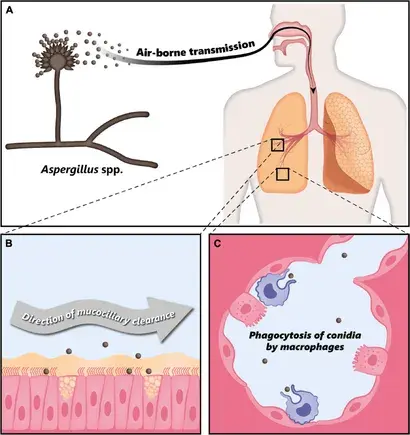ASPB (American Society of Plant Biologists) Biomics is a specialized division of the ASPB dedicated to the study and advancement of plant biomes, genomics, and related biotechnologies. To foster research and education in plant biomic studies, enhancing our understanding of plant ecosystems, genetics, and their applications in agriculture, medicine, and environmental sustainability.
Goals
During the aspBIOmics project, we aim to reach the following milestones:
- Development of a sensitive and specific nucleic acid based detection method
- Development of a sensitive and specific antigen based detection method
- Discriminative role of antigens / antibodies during IA infection
- Identification of cytokines and chemokines correlated with development of IA
- Responses of the innate immune cells to causes of IA infection
- Development of methods for the detection of relevant biomarkers of IA
- Molecular understanding of the resistance to antifungals used to treat IA
- Fitness of resistant strains in vivo
- Development of a method to survey resistant strains
- Definition of SNP associated to IA
- Functional relevance of selected SNP
- Association of SNP, which are genetically and functionally relevant to IA
- Collection and maintenance of clinical specimens from haematological patients
- Collection of host, clinical and mycology data from all patients according to the EORTC / MSG diagnostic criteria
- Global development of new diagnostic methods for IA

Project summary
The Consortium aspBIOmics aims to identify and to characterize new biomarkers for an effective management of invasive aspergillose (IA). Thereby, aspBIOmics focuses on a new, complementary approach; we will analyze the relevance of pathogen- as well as host- (patient-) parameters. Such an extensive additional knowledge on IA will allow a more successful outcome of this devastating disease.
The data generated within aspBIOmics will allow systematic analyses of the complete pathophysiology of IA, including diagnosis, resistance to antifungals, as well as genetic susceptibility to IA. In addition, we will develop commercial assays for an improved diagnosis of IA.
The consortium aspBIOmics consists of 5 different Work packages (WP). WP1 bases on the analysis of biomarkers of A. fumigatus (RNA, DNA, proteom analyses in clinical specimens), while WP2 focusses on the analysis of markers related to the immune response of patients (multiplex-ELISA assays, transcriptome analyses of immune cells ex vivo). In WP4, we will perform genetic-epidemiological analyses of risk markers of IA (arrays, functional analyses). In WP 5, we have included the sample archive, the data archive, the data management, as well as the development of commercial assays.

Core Areas of Focus
- Plant Genomics:
- Sequencing and analysis of plant genomes
- Understanding genetic variations and their implications
- Microbiome Studies:
- Exploring plant-microbe interactions
- Impact of microbiomes on plant health and growth
- Environmental Interactions:
- Studying plant responses to environmental changes
- Impact of climate change on plant biomes
- Biotechnology Applications:
- Genetic engineering for improved crop traits
- Development of sustainable agricultural practices
Meetings
The initial meeting of aspBIOmics was held on 31 May 2011 in Frankfurt, Germany. All partners of the consortium were present at this meeting. The partners agreed to initiate all 5 Work Packages.s host- (patient-) parameters. Such an extensive additional knowledge on IA will allow a more successful outcome of this devastating disease.

Research Initiatives
- Genome Mapping Projects:
- Comprehensive mapping of key agricultural crops
- Identification of genes responsible for disease resistance and yield
- Microbiome Engineering:
- Developing probiotics for plants
- Enhancing plant immunity through microbiome manipulation
- Climate Adaptation Studies:
- Research on plant resilience to extreme weather conditions
- Breeding crops for better climate adaptability
- Sustainable Agriculture:
- Innovations in biofertilizers and biopesticides
- Promoting eco-friendly farming techniques
Invasive aspergillosis
Invasive aspergillosis (IA) is the most common cause of infection-associated mortality in patients being treated for haematological malignancies and is an emerging disease in solid organ transplant recipients, critical care patients and in those receiving novel immunomodulatory therapies. Although, IA may be perceived to be an uncommon disease, with an incidence of 10,000 patients annually in Europe, there is increasing evidence that this infection is affecting a broader range of patient groups (Lerventakos et al., 2010, Clin Infect Dis 50: 405).
Aspergillus fumigatus is the most commonly isolated species from cases of IA and is the focus of our research, although we believe the intended outcomes will act as a paradigm for management of IA due to less common species such as A. flavus and the emerging A. terreus.
Due to the frequent need to treat suspected cases, IA is the most expensive opportunistic infection in immunosuppressed patients. The annual cost of treating fungal infections in Europe is approximately 200 million Euro. In-hospital stays complicated by IA cause additional costs of 75,000 Euro per patient in comparison to uninfected patients, underlining the socio-economic relevance of IA (Dasbach et al., 2000, Clin Infect Dis 31: 1524, White et al., 2010, J Clin Microbiol 48: 1231).
Pulmonary involvement was present in 97% of patients with Aspergillus infections, and the infection was widely disseminated to various organs in 25% of patients. The incidence in stem cell transplant patients has ranged from 5 - 20%, with a higher frequency in patients suffering from graft-versus-host disease (GVHD); mortality rates are 68 to 100% (Marr, 2010, Curr Opin Oncol 22: 138).
